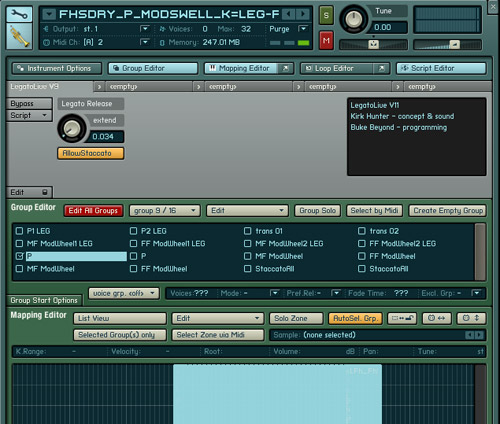Virtual ochestra sample libraries usually require serious cash and a high-end computer to run, but CDM’s resident game composer has found something different. US$325 and it’ll run on your existing computer? Chalk it up to another brilliant independent sample developer. W. Brent Latta takes this software orchestra for a compositional test drive. Don’t miss his sample music if you want to understand why he’s raving. -Ed.
Every few years, a small, innovative company comes along and changes the paradigm for high-quality sample libraries. With the power and accessibility of modern computers, this change has followed Moore’s law fairly closely and we’ve seen library upstarts transform from boutique shops to hugely successful producers in no time flat.

A few years ago, Gary Garritan blew the doors off the ‘hobbyist composer’ market by creating his remarkable and ultra-affordable Personal Orchestra (GPO). This offering made it possible for would-be composers and orchestrators to closely simulate a real orchestra, without having to pay the premium for libraries from the big sample houses. Housed in a Native Instruments Kompakt player, GPO is efficient and easy to use, even for composers without extensive sampling experiencing. GPO clocks in at around 2GB of sample data and is still one of the most popular sample libraries for beginning composers. Large sample houses such as EastWest, MOTU, and Miroslav have since followed suit, with many sub-$500 orchestral ‘plug-ins’ now widely available.
Fast forward to November 2005, when sample developer Kirk Hunter saw a gap that needed filling. Composers who sought more comprehensive sample libraries, but lacked the funds for the mammoth collections offered by EastWest, Vienna and Sonic Implants had limited choices. GPO, while an astounding value, lacked many of the more sophisticated articulations for many instruments and, with the popularity of the title, began to develop a ‘signature’ sound that many could recognize upon first hearing. With that in mind, Kirk set out to develop an orchestral library that offered a much broader array of samples, while still maintaining a low price-point. Aimed at users who already owned a full-featured sampler (Kontakt or Gigastudio), Hunter was able to cut out the middle-man used in many competing, inexpensive libraries – namely Native Instruments. Since he was able to eliminate the licensing fee and the additional work required to customize the Kompakt player, Hunter was able to hit an unheard of price point for his library: $325USD for a 20 GB (yes, that is twenty gigabytes!) library.
Here’s what the developer had to say about the concept behind this collection:
I wanted to create a huge-sounding, fantastic orchestral library that did not cost a fortune and did not have to have a MASSIVE rig to run it. While the newer KHSO Emerald is optimized for maximum quality with minimum system requirements, I also wanted to create an even “lighter” version that could run on almost any machine out there, but still sounds incredibly good (KHSO Sapphire). In designing KHSO Emerald, rather than include a ton of performances and “fun stuff” such as performed swells, sweeps, runs, etc., that occupy a lot of disk space, I wanted to create a “meat and potatoes” library where 90% of the samples are used 90% of the time.
Next: Setup and Use